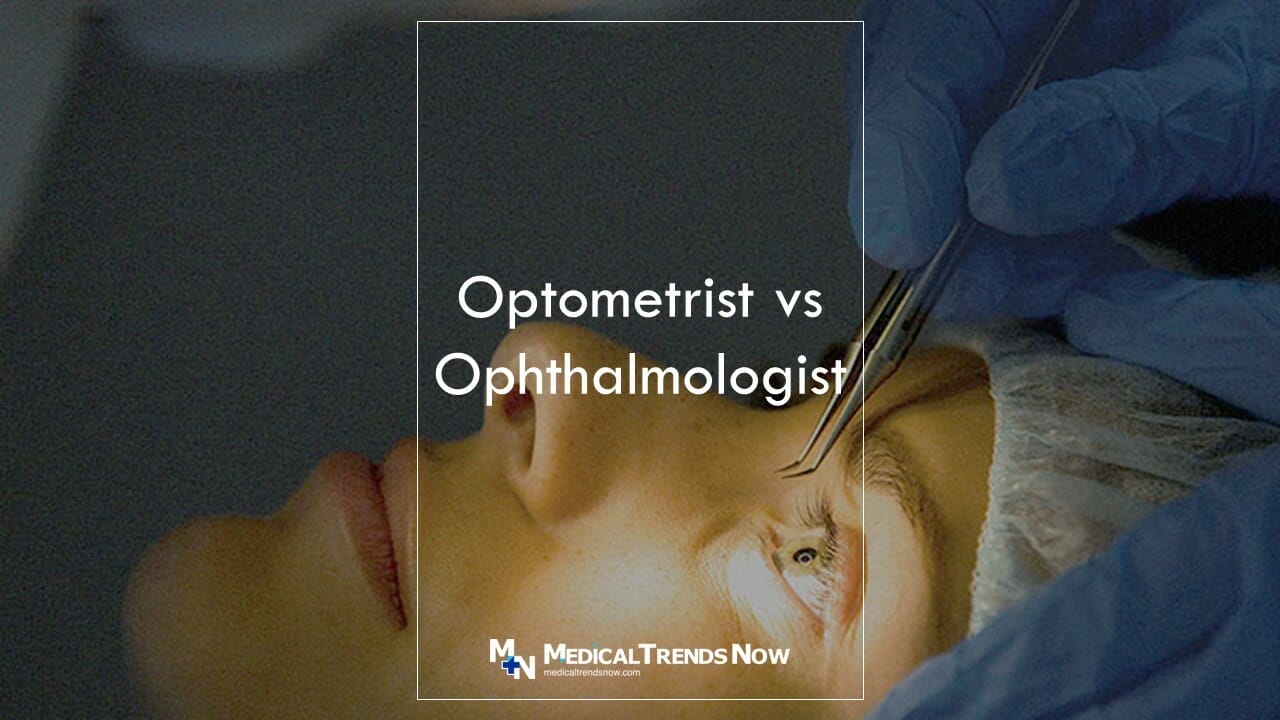Table of Contents
Here are eye-opening differences: Optometrist vs Ophthalmologist (and let’s not forget to include opticians).
Optometry and ophthalmology are two different medical fields that treat similar eye conditions. In this article, we will discuss the differences between optometry and ophthalmology.
What is Optometry
Optometry is a branch of health care that deals with the examination, diagnosis, and treatment of disorders of the visual system. Optometrists are primary eye care providers who are trained to examine eyes, prescribe corrective lenses, and diagnose and treat certain eye diseases.
Optometry is a rapidly growing profession that offers a rewarding career for those interested in helping people maintain healthy vision. Optometrists play an important role in the detection and management of many common eye diseases, such as glaucoma, cataracts, and macular degeneration.
What is an Optometrist
An optometrist is a healthcare professional (doctor of optometry) who specializes in the examination and treatment of the eyes and vision. Optometrists are trained to perform comprehensive eye exams, prescribe and dispense corrective lenses, and detect and manage eye diseases.
Optometrists play an important role in maintaining the health of our eyes and vision. By performing regular eye exams, optometrists can identify problems early and provide treatment to help prevent further damage. In addition to diagnosing and treating eye conditions, optometrists also prescribe corrective lenses to help improve vision.
If you are having problems with your vision, or if it is time for your annual eye exam, make sure to see an optometrist. Optometrists are dedicated to helping people maintain healthy eyesight, and they can provide the care you need to keep your eyes healthy for years to come.
What is Ophthalmology
Ophthalmology is a branch of medicine that deals with the anatomy, physiology, and diseases of the eye. It is a surgical specialty that requires both medical and surgical training.
Ophthalmologists are medical doctors who have completed four years of medical school and four years of residency training in ophthalmology. They are licensed to practice medicine and perform surgery.
Ophthalmology is a vital branch of medicine. Ophthalmologists play an important role in diagnosing and treating eye diseases, as well as providing routine eye care.
What is an Ophthalmologist
An ophthalmologist is a medical doctor who specializes in the diagnosis and treatment of eye diseases and conditions or disorders. Ophthalmologists are trained to perform eye exams, prescribe medications, and perform surgery.
Ophthalmologists can treat a wide range of eye conditions, including cataracts, glaucoma, and macular degeneration. They also provide routine eye care, such as comprehensive eye exams and contact lens fittings.
If you are experiencing any problems with your vision, or if you have any questions about your eye health, schedule an appointment with an ophthalmologist today.
What Are the Differences Between Ophthalmology and Optometry?
Ophthalmology is the medical specialty that specializes in the diagnosis and treatment of diseases and conditions of the eye. Optometry is the scientific and professional practice of optometry, which encompasses education, research, and patient care.
The two disciplines have many similarities, but there are also significant differences. For example, ophthalmologists typically have more experience with treating diseases of the eye than do optometrists.
Additionally, optometrists are often able to prescribe glasses and other optical products directly to patients, whereas ophthalmologists typically work with specialists in other medical fields who provide these services.
The two disciplines also have different goals. Ophthalmology is primarily focused on providing care for patients who have diagnosed diseases or conditions that affect their vision. In contrast, optometry is focused on helping people achieve the optimal vision by correcting their eyesight problems.
Additionally, ophthalmology focuses on diagnosing and treating diseases, while optometry focuses on preventing disease through appropriate eyeglasses usage and other optical treatments.
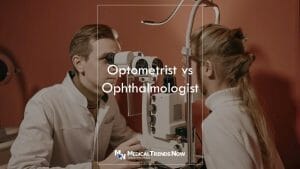
Optometry and Ophthalmology: How Are They Similar?
Optometry and Ophthalmology are both medical fields that focus on the diagnosis, treatment, and prevention of eye disorders. Both medical school disciplines use various diagnostic tools, including optical devices such as telescopes and eyeglasses, to examine the eye. Ophthalmologists also perform surgery on the eyes, while optometrists do not.
Despite their differences, there are several similarities between optometry and ophthalmology. Both fields rely heavily on diagnostic tools such as optical devices and perform comprehensive eye exams to diagnose eye disorders. In addition, both disciplines have a strong focus on providing quality care to patients through diagnosis and treatment of various eye problems.
How Do Optometrists Treat Eye Conditions?
Optometrists treat eye conditions with glasses, contact lenses, and other treatments. Most optometrists are specialists in one or more areas of optometry, such as vision correction, eye health evaluation, or pediatric optometry. They learned their knowledge from optometry school.
Optometrists often work together with other medical doctors in the medical field to treat patients’ eye conditions. You may see an optometrist for your glasses, contact lenses, and other non-invasive treatments.
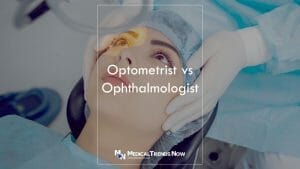
How Do Ophthalmologists Treat Eye Conditions?
Optometrists are medical professionals who specialize in the diagnosis, treatment, and prevention of vision problems. The difference between an optometrist and an ophthalmologist depends on the medical eye treatments.
Optometry is the branch of medicine that deals specifically with the diagnosis, treatment, and prevention of eye conditions. Ophthalmologists are physicians who specialize in the diagnosis and treatment of diseases and conditions of the eyes. They may also perform eye surgeries on the eyes. Ophthalmology is one of the most highly respected specialties in medical care.
Why Choose One Over the Other?
You may know the difference between optometrists and ophthalmologists through their eye care treatment services. Optometry is a profession that focuses on providing eye care.
Ophthalmology is a medical specialty that focuses on the health of the eyes. There are many reasons why a person might choose one over the other. Ophthalmologists typically have more experience treating eye diseases and injuries, while optometrists may be better equipped to prescribe glasses and other optical devices.
Additionally, ophthalmologists may be better suited to perform surgery on the eyes, while optometrists may not have as much experience performing these procedures.

How Can You Tell If an Eye Care Doctor Is an Optometrist or Ophthalmologist?
There are a few ways to tell if a doctor is an optometrist or ophthalmologist. One way is to look at their education.
Optometrists typically have a college degree in optometry, while ophthalmologists typically have a medical degree and have completed an optometry residency.
Another way to tell is by looking at their practice style. Optometrists typically work in private practices, while ophthalmologists usually work in hospitals or clinics.
Finally, one can also look at the type of patients they see. Ophthalmologists tend to see more eye problems than optometrists do, but both types of doctors can treat eye problems.
Which Is a Better Option for You?
There are many options for optometry and ophthalmology, and it cannot be easy to decide which is the best option for you.
Ophthalmology may be better if you have a high level of interest in eye health and want to specialize in that area.
Optometry may be a better option if you want to work with people who have common vision problems, such as eyestrain or vision problems that are caused by diabetes or another medical condition. You will also likely find more opportunities to work with patients in optometry than in ophthalmology.
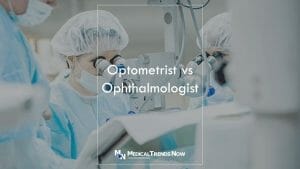
What Are The Three Different Types Of Eye Doctors?
There are three types of eye doctors: ophthalmologists, optometrists, and opticians. Ophthalmologists are the most experienced and educated in diagnosing and treating eye diseases. They also tend to be the most expensive to see. Optometrists treat only vision problems such as eyestrain, eyestrain, blurry vision, and astigmatism. They do not diagnose or treat any type of disease or injury to a certain eye. Opticians perform eye exams and can fit you with glasses or contact lenses.
When is it better to see an ophthalmologist, optometrist, and optician?
There are a few factors to consider when deciding which eye care professional you must visit. The nature of the problem, whether the problem is acute or chronic, and whether the patient has any other health issues that could be affected by their vision should all be considered.
It is generally advisable to see an ophthalmologist if there is a serious injury or if the patient has a condition such as glaucoma that requires ongoing treatment. Optometrists can treat most common vision problems, such as farsightedness or nearsightedness, and prescribe glasses or contact lenses. Opticians can provide basic eye health services such as examinations and refractions, but they are not licensed to diagnose or treat medical conditions.

How Do Optometrists, Ophthalmologists, And Opticians Work Together?
Optometrists treat patients with eye diseases and injuries, while ophthalmologists diagnose and treat diseases or conditions affecting the eyes. Optician fits lenses into eyeglasses to correct vision. They also prescribe glasses, contact lenses, and other vision-related products. Together, and opticians, ophthalmologists and optometrists work together to provide quality care for patients’ eyes.
How To Choose The Right Eye Doctor (From Contact Lenses To Surgical Eye Care)?
One of the most important decisions you will make in your life is choosing the right eye doctor. There are various factors to consider when choosing an eye doctor, including their qualifications, experience, and patient satisfaction ratings. When looking for an eye doctor, be sure to consider the following:
- Qualifications: Make sure the eye doctor has proper training and experience in ophthalmology or optometry. They should be able to provide you with accurate information about your eyes and vision.
-
Experience: Consider how many years the doctor has been practicing and whether they have published any research on their work. An experienced doctor will be more likely to provide you with quality care.
-
Patient satisfaction ratings: Before making a decision about who to see, check online reviews or ask friends for recommendations. Patients typically rate doctors highly if they are satisfied with their care provider.
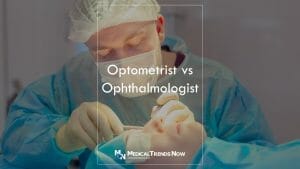
Do You Need a Dilated Eye Exam?
There are many reasons why you may need a dilated eye exam. Some of the most common reasons include: if you have a history of eye problems, if you notice changes in your vision, or if you experience discomfort when reading or using your computer.
A dilated eye exam is a procedure that uses lenses to make your eyes more open. This allows your optometrist or ophthalmologist to look inside your eyes more easily and diagnose any potential problems. A dilated eye exam can also help identify if you are experiencing age-related macular degeneration (AMD), which is a leading cause of vision loss in older adults.
For Eyeglasses And Contact Lenses, Which Eye Care Services Should I Choose?
Since ophthalmologists are experts in diagnosing and treating eye diseases and injuries, they are typically the doctors who prescribe eyeglasses or contact lenses. On the other hand, optometrists are qualified to diagnose and treat common vision problems such as nearsightedness or farsightedness, but they may not be able to prescribe eyeglasses or contact lenses.
In general, if you have a question about your eyesight or need an evaluation for glasses or contacts, you should see an ophthalmologist. If you have questions about your glasses or contacts but don’t think you need an appointment with an ophthalmologist, you can see a doctor who is certified in optometry (such as an optometrist).
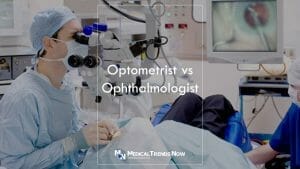
How To Become An Optometrist?
An optometrist is an eye care professional who provides primary vision care, which includes examination and testing of the eyes for visual acuity and defects, and prescribing corrective lenses. Optometrists also provide low vision care and management of eye disease.
To become an optometrist, you must complete a 4-year bachelor’s degree program at an accredited college or university. Upon completing your undergraduate degree, you will then need to attend a 4-year optometry school. After successfully completing optometry school, you will be required to pass the National Board of Examiners in Optometry (NBEO) exam in order to obtain your license.
Once you have obtained your license, you can then start practicing optometry. However, it is important to note that many states require optometrists to complete continuing education courses in order to maintain their license.
How To Become An Ophthalmologist?
An ophthalmologist is a medical doctor who specializes in the diagnosis and treatment of eye abnormalities or disorders. Ophthalmologists are trained to perform eye exams and vision tests, prescribe medications, and medical or surgical eye care.
To become an ophthalmologist, you must first complete a four-year undergraduate degree. After that, you must complete a three-year residency program in ophthalmology. Once you have completed your residency, you must pass the boards to become certified by the American Board of Ophthalmology.
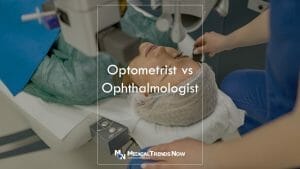
How To Become An Optician?
In order to become an optician, one must complete an accredited optician program and pass a state-administered exam. Most opticians work in retail settings, such as eyeglass stores, optical goods stores, or department stores. They have an important role in providing eye care within the commercial setting. Some may also work in private practices or hospitals.
Becoming an optician typically requires completing four years of optometry school with an accredited optician program and passing a state-administered examination. Although most opticians work in retail settings—such as eyeglass stores, optical goods stores, or department stores—some may also find employment in private practices or hospitals.
The first step to becoming an eye health professional, such as an optician, is completing an accredited program through a vocational school, community college, or four-year university. These programs usually take two to three years to complete and include coursework in optics, vision science, anatomy, and physiology.
Summing Up: Optometrists vs Ophthalmologists
Both optometry and ophthalmology are the right eye care professionals for treating eye conditions. Choosing the right eye care doctor for your serious eye condition should be straightforward. If you happen to visit a family doctor, your doctor will refer you to an ophthalmologist, while for eye vision correction, you will be referred to an optometrist.
In conclusion, optometrists and ophthalmologists are both doctors who specializes in eye and vision. Both provide different care for all eye problems and routine eye care needs of their patients. Optometrists can prescribe glasses and contact lenses, and they also provide vision therapy. Ophthalmologists can prescribe glasses and contact lenses, but they also provide surgical treatments. When choosing an eye doctor, it is important to consider what services you need.
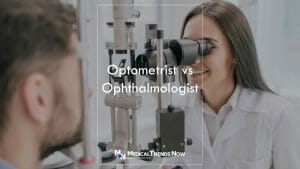
Sources: Optometrists vs Ophthalmologists
- The Three Types Of Eye Doctors | AUC School of Medicine
- Difference between an Ophthalmologist, Optometrist and Optician – American Association for Pediatric Ophthalmology & Strabismus
- What is the Best Option for Eye Care? – Cleveland Clinic
- What is an Ophthalmologist? – American Academy of Ophthalmology
- What’s a doctor of optometry? – American Optometric Association
- What is an optician? – Opticians Association of America (OAA)

